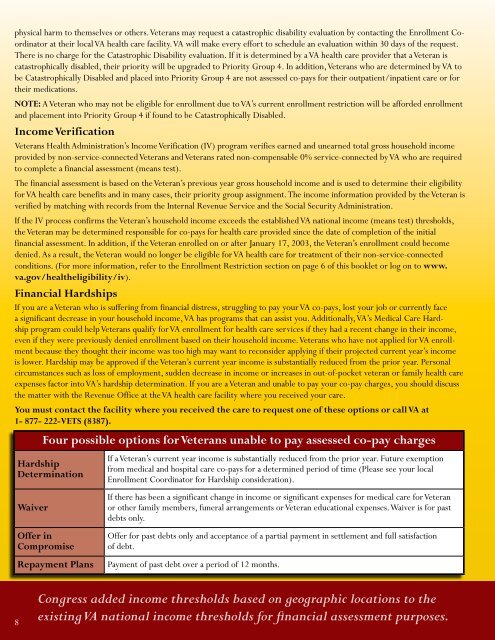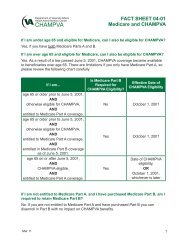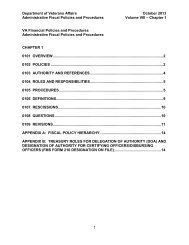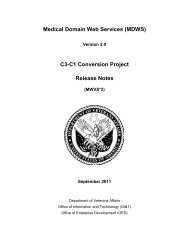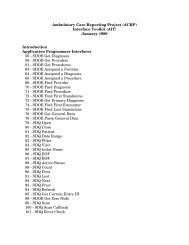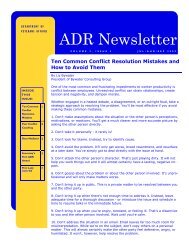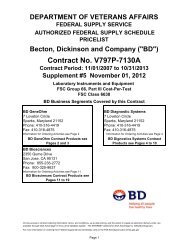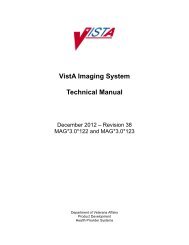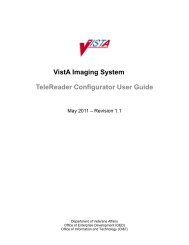VA Health Care Benefits Overview Brochure - US Department of ...
VA Health Care Benefits Overview Brochure - US Department of ...
VA Health Care Benefits Overview Brochure - US Department of ...
You also want an ePaper? Increase the reach of your titles
YUMPU automatically turns print PDFs into web optimized ePapers that Google loves.
physical harm to themselves or others. Veterans may request a catastrophic disability evaluation by contacting the Enrollment Coordinator<br />
at their local <strong>VA</strong> health care facility. <strong>VA</strong> will make every effort to schedule an evaluation within 30 days <strong>of</strong> the request.<br />
There is no charge for the Catastrophic Disability evaluation. If it is determined by a <strong>VA</strong> health care provider that a Veteran is<br />
catastrophically disabled, their priority will be upgraded to Priority Group 4. In addition, Veterans who are determined by <strong>VA</strong> to<br />
be Catastrophically Disabled and placed into Priority Group 4 are not assessed co-pays for their outpatient/inpatient care or for<br />
their medications.<br />
NOTE: A Veteran who may not be eligible for enrollment due to <strong>VA</strong>’s current enrollment restriction will be afforded enrollment<br />
and placement into Priority Group 4 if found to be Catastrophically Disabled.<br />
Income Verification<br />
Veterans <strong>Health</strong> Administration’s Income Verification (IV) program verifies earned and unearned total gross household income<br />
provided by non-service-connected Veterans and Veterans rated non-compensable 0% service-connected by <strong>VA</strong> who are required<br />
to complete a financial assessment (means test).<br />
The financial assessment is based on the Veteran’s previous year gross household income and is used to determine their eligibility<br />
for <strong>VA</strong> health care benefits and in many cases, their priority group assignment. The income information provided by the Veteran is<br />
verified by matching with records from the Internal Revenue Service and the Social Security Administration.<br />
If the IV process confirms the Veteran’s household income exceeds the established <strong>VA</strong> national income (means test) thresholds,<br />
the Veteran may be determined responsible for co-pays for health care provided since the date <strong>of</strong> completion <strong>of</strong> the initial<br />
financial assessment. In addition, if the Veteran enrolled on or after January 17, 2003, the Veteran’s enrollment could become<br />
denied. As a result, the Veteran would no longer be eligible for <strong>VA</strong> health care for treatment <strong>of</strong> their non-service-connected<br />
conditions. (For more information, refer to the Enrollment Restriction section on page 6 <strong>of</strong> this booklet or log on to www.<br />
va.gov/healtheligibility/iv).<br />
Financial Hardships<br />
If you are a Veteran who is suffering from financial distress, struggling to pay your <strong>VA</strong> co-pays, lost your job or currently face<br />
a significant decrease in your household income, <strong>VA</strong> has programs that can assist you. Additionally, <strong>VA</strong>’s Medical <strong>Care</strong> Hardship<br />
program could help Veterans qualify for <strong>VA</strong> enrollment for health care services if they had a recent change in their income,<br />
even if they were previously denied enrollment based on their household income. Veterans who have not applied for <strong>VA</strong> enrollment<br />
because they thought their income was too high may want to reconsider applying if their projected current year’s income<br />
is lower. Hardship may be approved if the Veteran’s current year income is substantially reduced from the prior year. Personal<br />
circumstances such as loss <strong>of</strong> employment, sudden decrease in income or increases in out-<strong>of</strong>-pocket veteran or family health care<br />
expenses factor into <strong>VA</strong>’s hardship determination. If you are a Veteran and unable to pay your co-pay charges, you should discuss<br />
the matter with the Revenue Office at the <strong>VA</strong> health care facility where you received your care.<br />
You must contact the facility where you received the care to request one <strong>of</strong> these options or call <strong>VA</strong> at<br />
1- 877- 222-VETS (8387).<br />
8<br />
Four possible options for Veterans unable to pay assessed co-pay charges<br />
Hardship<br />
Determination<br />
Waiver<br />
Offer in<br />
Compromise<br />
If a Veteran’s current year income is substantially reduced from the prior year. Future exemption<br />
from medical and hospital care co-pays for a determined period <strong>of</strong> time (Please see your local<br />
Enrollment Coordinator for Hardship consideration).<br />
If there has been a significant change in income or significant expenses for medical care for Veteran<br />
or other family members, funeral arrangements or Veteran educational expenses. Waiver is for past<br />
debts only.<br />
Offer for past debts only and acceptance <strong>of</strong> a partial payment in settlement and full satisfaction<br />
<strong>of</strong> debt.<br />
Repayment Plans Payment <strong>of</strong> past debt over a period <strong>of</strong> 12 months.<br />
Congress added income thresholds based on geographic locations to the<br />
existing <strong>VA</strong> national income thresholds for financial assessment purposes.


